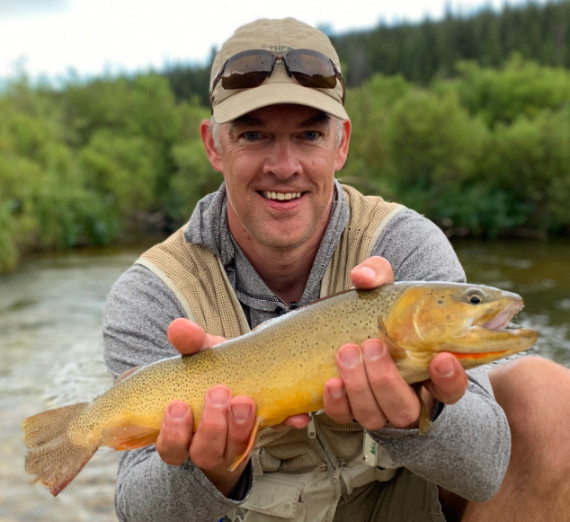GU Alum and Scientist Dan Vimont Speaks on Climate, Community and More

In 2008, a group of scientists and managers founded the Wisconsin Initiative on Climate Change Impacts (WICCI) to address climate change effects in Wisconsin. Since its inception, WICCI’s community-building approach has become a nationally recognized model for understanding and adapting to climate change impacts.
Gonzaga’s Institute for Climate, Water, and the Environment will host Daniel Vimont, a climate sciences professor at UW-Madison and Gonzaga alum, March 4 in Hemmingson Auditorium at 6 p.m. He’ll discuss WICCI’s grassroots approach and the benefits of a Jesuit education in tackling institutional change.
In preparation for his campus visit next week, I interviewed Vimont via email about his background and passion for the climate sciences.
Responses have been edited for length and clarity.
FLUKER: Can you share a pivotal moment or experience that sparked your interest in the climate sciences? How has that shaped your career trajectory?
VIMONT: My interest in climate science emerges from a love of being outdoors and an enjoyment of math and physics. Growing up in the Pacific Northwest, my family was always doing something outdoors — hiking or skiing in the Cascades, fishing in the local rivers and lakes, walking the beaches of Puget Sound. At Gonzaga, my interests in math and physics intersected perfectly with my love of the outdoors as I pursued a physics degree, rowed on the men’s rowing team and enjoyed the Inland Northwest environment. That, combined with an opportunity to participate in a research project modeling the atmospheric circulation in Southern California, solidified my interest in pursuing graduate studies in climate sciences.
How has Jesuit philosophy influenced your work, particularly in academia and community-related efforts?
Oh wow, I could write pages on this one — my Jesuit education impacts nearly everything I do in my work.
As an educator, I embrace Jesuit values of developing the “whole person” by encouraging students to think beyond the material and think about the human aspects of what we study, such as the role of social justice in climate impacts and the historical implications affecting the field today. I advocate for experiential learning and encourage students to get outside to deepen their understanding and appreciation of the weather.
As a climate researcher, I helped develop a community-based organization that has transformed the way Wisconsin understands and addresses climate impacts and has become a model for similar efforts across the country. This “many parts, one body” approach brings together diverse perspectives from the community to identify and shape potential solutions around climate impacts. That community approach is necessary for identifying new research needs and shaping solutions that align with the value systems of the people who are affected.
Looking ahead, the big problems that we will face emerge from highly interconnected social, technical and environmental systems. Addressing these problems will require systems-based approaches that transcend disciplinary boundaries, recognize and appreciate diverse ways of thinking and root our actions in a broad value system that emphasizes a “greater good.” The relevance and need for Jesuit philosophy has never been stronger.
How do you approach communication with individuals or groups who may be skeptical or resistant to scientific findings regarding climate change?
I’m a talker. My kids roll their eyes any time I’m out in the yard because they know I’ll end up in some extended conversation with a stranger walking by. That skill works well with people who are skeptical or resistant to thinking about climate change. I find that (and social science on communication shows that) interpersonal interaction breaks down a lot of barriers to thinking about climate change. When someone is skeptical about climate science, I’ll start with, “Have you noticed any changes in our climate since you were a kid?” or “What climate impacts have you noticed?” That human interaction breaks down some of the barriers that our world builds for us and we can move forward to thinking about solutions.
What made you choose GU as an undergraduate?
In high school, I was debating whether to attend University of Washington and study jazz piano or go to Gonzaga to study physics (I made the right choice – I’m not a great pianist). Around that time, a close family friend, Fr. Philip Boroughs, S.J., sat down with me to discuss my future, and upon finding out my interest in meteorology and physics, stood up and phoned another Jesuit who was teaching in Gonzaga’s physics department. They arranged a meeting during a visit weekend, and the rest is history. I think about that ten-minute conversation with Fr. Phil a lot – a tiny gesture on Fr. Phil’s part that fundamentally changed the rest of my life – and try to pay it forward. We never know when a simple conversation with a student, or a few minutes of our time, may change someone’s world.
How does it feel to see your son as a Gonzaga Bulldog?
I’m thrilled for him! Gonzaga has always been a special place with such a strong community, outstanding students, great educational opportunities, caring faculty and staff and a beautiful environment. But there is so much that has changed here as well, and so many new opportunities! I couldn’t be more excited to see him forge his own path here at Gonzaga!
